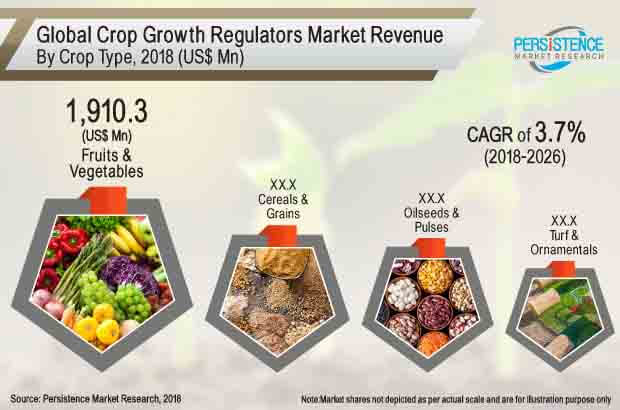Crop Growth Regulators Market Segmented By Cytokinins, Auxins, Gibberellins, Ethylene Product in Wettable Powders, Solutions Formulation with Fruits and Vegetables, Cereals and Grains, Oilseeds and Pulses, Turf and Ornamentals Crop in Promoters and Inhibitors Function
Industry: Food and Beverages
Published Date: August-2018
Format: PPT*, PDF, EXCEL
Delivery Timelines: Contact Sales
Number of Pages: 262
Report ID: PMRREP24148
The global agriculture sector is changing rapidly with increasing developments across the globe. Emerging markets are growing rapidly and have become major drivers of demand for food. Meanwhile, resource constraints are putting pressure on fragile supply-demand equilibrium, new technologies are emerging, and consumers in developed markets are taking a more active role in deciding what industry produces. A fundamental shift is redefining the industry structure.
In the coming decades, a growing and increasingly affluent global population will demand a greater quantity, variety and nutritional value of food than the world has ever produced. Meeting this demand will require a 70% increase in food production, challenging a natural resource base that is already under significant strain. It will also require major increases in investment – by up to 50% for developing countries alone – in an era of economic crisis and austerity.
Addressing these challenges effectively will require the use of productivity enhancing products such as crop growth regulators – one which leverages available resources to deliver economic growth, output, and opportunity, improved food security and nutrition, and environmental sustainability.
Crop growth regulators are agrochemicals that influence the development of plants which are required at very low concentrations. There are natural regulators, which are produced by the plant itself, and also synthetic regulators; those found naturally in plants are called phytohormones or plant hormones. The crop growth regulators market is segmented on the basis of product type, formulation type, crop type, and function.
The growth in the crop growth regulators market is boosted by the growing preference of crop growth regulators for crop production. Major shareholding companies looking out for ways in protecting and increasing the efficiency of growing cereals. Several key cereals producers in North America and Europe have been strategizing on improving their efficiency in terms of product offerings (pulses). In order to achieve their targets, these companies have been using several latest technologies and products, such as crop growth regulators, in their processes.
In terms of revenue, the global crop growth regulators market is expected to represent an incremental opportunity of 252.8 Mn by 2018 end over 2017. By product type, the auxins segment is expected to register a CAGR of 5.1% in the crop growth regulators market. The Middle East & Africa region is expected to register relatively moderate growth in the crop growth regulators market, due to limited farming area.
Globally, the quality of soil is declining due to various reasons such as overgrazing, agricultural activities, deforestation, overexploitation of land to produce fuel wood, and industrialization. Crop growth regulators influence the growth and differentiation of plant cells, tissues, and organs.
They promote the fast growth of plants, no matter if they are fruits & vegetables, cereals & grains, or oilseeds & pulses, which indirectly helps in meeting the rising consumer demand for various types of food products. Hence, this one critical factor helps drive the demand for crop growth regulators.
Advances in biotechnology have culminated in the revolution of the crop growth regulators market as manufacturers are increasingly focusing on the research & development of better and customized crop growth regulators products in the market. Hence, the development of disease-specific specialized crop growth regulators products, especially in the developed countries is on the rise.
A major factor hampering the growth of the global crop growth regulators market is the concern for stringent regulatory norms regarding the use of the product. This is due to side effects such as allergic reactions and other health-related issues due to the consumption of food products which are administered with plant or crop growth regulators.
Although crop growth regulators have been used in various segments of the food and beverage industry, over the past couple of years, their consumption has been low, which is attributable to limited regulatory approvals by respective legislations, owing to the health concerns of consumers across the globe.

On the basis of region, the market in Asia Pacific is anticipated to dominate the global crop growth regulators market in 2018. North America is expected to gain significant market share in revenue terms by 2026 end. Moreover, U.S. is projected to exhibit significant CAGR during the forecast period, in the crop growth regulators market.
| Attribute | Details |
|---|---|
| By Product Type |
|
|
By Formulation Type |
|
| By Crop Type |
|
| By Functions |
|
|
By Region |
|
To know more about delivery timeline for this report Contact Sales
